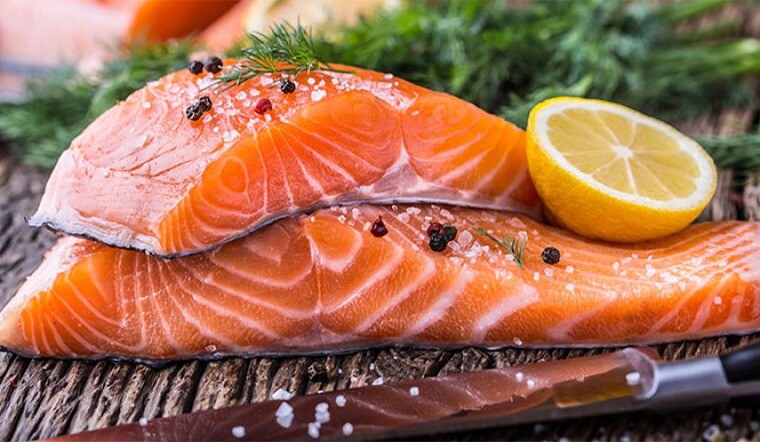Dr. Liu Boren highlights the health benefits of fish, which are rich in Omega-3 fatty acids, including DHA and EPA. These nutrients are known to potentially aid in cancer prevention and support brain health and vision. Among the various types of fish, Liu Boren recommends prioritizing smaller to medium-sized fish such as salmon, mackerel, herring, and sardines due to their abundant supply of healthy oils.
Four Types of Fish, from Premium to Affordable, That Are Good for Your Health
+ Salmon
Research from the Harvard T.H. Chan School of Public Health has shown that salmon, rich in Omega-3 fatty acids, helps improve blood cholesterol and blood pressure. Salmon is an excellent source of protein, healthy fats, carbohydrates, unsaturated fatty acids, and DHA, all of which are beneficial for cardiovascular health. It helps reduce inflammation, lower blood pressure, improve blood clotting, prevent strokes, and regulate heart rhythm.
Consuming salmon regularly on a weekly basis can help reduce the risk of cardiovascular diseases.

Salmon. (Illustrative image)
+ Mackerel
Mackerel is an excellent source of vitamin B12, which is beneficial for overall health and cardiovascular well-being. It also provides niacin, iron, vitamin B6, riboflavin, magnesium, phosphorus, folate, and selenium. Additionally, mackerel can be a rich source of vitamin D for the body.
A study at McMaster University involving 192,000 individuals from 58 countries, including 51,000 cardiovascular patients, found that consuming a minimum of 175g of fatty fish per week (equivalent to 2 servings of fish) reduced the risk of sudden death and overall mortality by 21% and 18%, respectively. It also lowered the risk of cardiovascular events such as heart attacks and strokes by 16% over the next ten years.
+ Herring
Herring is particularly rich in Omega-3 fatty acids, vitamin D, vitamin B12, and protein. It contains high levels of DHA and Omega 3 oils. Additionally, the calcium, selenium, vitamin B6, and potassium in herring support bone and cardiovascular health.
The high cholesterol content in herring is beneficial as it helps remove bad cholesterol from the body, thereby reducing the risks associated with cardiovascular diseases. Herring oil helps reduce fat cells in the body, preventing high blood lipid levels, fatty liver, and diabetes.

Herring. (Illustrative image)
+ Sardines
Sardines are an excellent source of Omega-3 fatty acids, which help lower triglyceride and unhealthy cholesterol levels in the blood, promoting a healthy cardiovascular system. They are high in protein, low in fat, and their Omega-3 acids help neutralize body fat.
Types of Fish to Consume in Moderation
Consuming large amounts of fish with high mercury content can lead to mercury accumulation in the body. While small amounts of mercury are not harmful to most adults, they can be detrimental to the brain and nervous system development of fetuses and young children. Therefore, it is advisable to limit the consumption of fish with potentially high mercury content.
It is important to note that mercury occurs naturally in small quantities in the environment, but pollution from factories and other industries can increase mercury levels in lakes, rivers, and oceans. As fish feed on this contaminated prey, they accumulate mercury in their bodies. Larger fish that occupy higher positions in the food chain tend to have higher mercury levels as they feed on smaller fish. The longer a fish lives and feeds, the more mercury it is likely to contain. Fish that may have higher mercury levels include shark, swordfish, king mackerel, and tilefish.
“Boost Hair Growth and Reduce Hair Loss with these 8 Biotin-Rich Foods”
Biotin, also known as vitamin B7, is a water-soluble vitamin that plays a crucial role in promoting hair growth and preventing hair loss. To boost your hair health, it is essential to incorporate biotin-rich foods into your diet. Imagine having the power to transform your tresses with every bite. With a careful selection of biotin-rich foods, you can nourish your hair from within, encouraging stronger, healthier hair growth.





































